新疆维吾尔自治区20##届高中学业水平考试标准《英语》
一、考试目的与性质
根据高中学生认知能力发展的特点和学业发展的需求,高中英语课程强调在进一步发展学生综合语言运用能力的基础上,着重提高学生用英语获取信息、处理信息、分析问题和解决问题的能力,特别注重提高学生用英语进行思维和表达的能力;形成跨文化交际的意识和基本的跨文化交际能力;进一步拓宽国际视野,增强爱国主义精神和民族使命感,形成健全的情感、态度、价值观,为未来发展和终身学习奠定良好的基础。
新疆维吾尔自治区普通高中英语科目学业水平测试是国家承认的省级毕业水平考试。高中英语科目学业水平考试是考核高中学生英语学习是否达到普通高中《英语课程标准》要求的基本方式,也是考查和评估高中英语教学质量的重要手段之一。
高中学业水平测试和高考既有区别又有联系,要注意二者的衔接。
一. 考试形式与试卷结构
1、考试形式
闭卷笔试(85%),听力测试(15%)。考试时间120分钟,总分值100分。试卷分Ⅰ卷(客观性试题)和Ⅱ卷(主观性试题)。
备注:由于20##届高中学业水平测试实行网上阅卷,因此选择题答案必须使用2B铅笔填涂,非选择题答案必须用0.5毫米黑色字迹签字笔书写在答案卷上。
2、试卷结构
Ⅰ卷包括四个大题:
第一题:听力(配备录音磁带施考,考试开始后15分钟内完成)。本题分两个小节,听力部分均设A、B、C三个选项。
第二题:单项填空。每题题干包括一两句话,句中设空白,要求考生根据句意从每题所给的四个选项中选出一个句子空白处所需的正确答案。
第三题:完形填空。在一段难度适中的短文中留15个空白,要求考生从所给的选项中选出一个正确答案。
第四题:阅读理解。
II卷包括三个大题:
第五题:选词填空。要求考生从所给出的12个单词或短语中选出10个填人空白处,使短文正确通顺。每空一词,不得重复。
第六题:补全对话,要求考生从7个句子中选出5个,抄写在对话空格处,以使对话完整。
第七题:命题作文。要求考生根据所给出的信息及要求,完成一篇语法规范、行文流畅的文章,字数80-100。
全卷的难度比值为8:1:1,即:容易题占80%,稍难题占10%,较难题占10%。全卷小题号通排。

二. 考试方法和要求
(一)听
1、能识别语段中的重要信息并进行简单的推断;
2、能听懂操作性指令,并能根据要求和指令完成任务;
3、能听懂正常语速听力材料中对人和物的描写、情节发展及结果;
4、能听懂有关熟悉话题的谈话并能抓住要点;
5、能听懂有关熟悉话题的内容,识别不同语气所表达的不同态度;
6、能听懂一般场合的信息广播,例如:天气预报。
(二)读
1、能从一般性文章中获取和处理主要信息;
2、能理解文章主旨和作者意图;
3、能通过上下文克服生词困难,理解语篇意义;
4、能通过文章中的线索进行推理;
5、能根据需要从网络等资源中获得信息;
6、能阅读适合高中生的英语报刊或杂志;
7、除教材外,课外阅读量应累计达到23万词以上。
(三)写
1、能用文字及图表提供信息并进行简单描述;
2、能写出常见体裁的应用文,例如:信函和一般通知等;
3、能描述人物或事件,并进行简单的评论;
4、能填写有关个人情况的表格,例如:申请表等;
5、能以小组形式根据课文改编短剧。
四、考试目标和范围:
高中英语学业水平测试着重考查英语学科的基础知识和基本技能,学科主干知识和技能的覆盖率不低于80%。英语学业水平测试内容取材与现行高中英语教材必修一至必修五的全部内容,同时考查初中英语的全部内容。考查的基础知识范围如下:
(一)词汇(按七级目标要求)《普通高中英语课程标准》
(二)功能意念项目表
1.社会交往(Social Communications)
(1)问候(Greetings)(2)介绍(Introduction)(3)告别(Farewells)(4)感谢(Thanks)(5)道歉(Apologies)(6)邀请(Invitation)
(7)请求允许(Asking for permission)
(8)祝愿和祝贺(Expressing wishes and congratulations)
(9)提供帮助(Offering help)
(10)接受或拒绝(acceptance and refusal)
(11)约会(Making appointments)(12)打电话(Making telephone calls)
(13)就餐(Having meals)(14)就医(Seeing the doctor)
(15)购物(Shopping)(16)问路(Asking the way)
(17)谈论天气(Talking about weather)
(18)语言交际困难(Language difficulties in communication)
(19)提醒注意(Reminding)(20)警告和禁止(Warning and prohibition)
(21)劝告(Advice)(22)建议(Suggestions)
2.态度(Attitudes)
(23)同意和不同意(Agreement and disagreement)
(24)喜欢和不喜欢(likes and dislikes)
(25)肯定和不肯定(Certainty and uncertainty)
(26)可能和不可能(Possibility and impossibility)
(27)能够和不能够(Ability and inability)
(28)偏爱和优先选择(Preference)
(29)意愿和打算(Intentions and plans)
(30)希望和愿望(Hopes and Wishes)
(31)表扬和鼓励(Praise and encourage)
(32)责备和抱怨(Blame and complain)
(33)冷淡(Indifference)(34)判断与评价(Judgment and evaluation)
3.情感(Emotions)
(35)高兴(Happiness)(36)惊奇(Surprise)(37)忧虑(Worries)
(38)安慰(Reassurance)(39)满意(Satisfaction)(40)遗憾(Regret)(41)同情(Sympathy)(42)恐惧(Fear)(43)愤怒(Anger)
4.时间(Time)
(44)时刻(Point of time)(45)时段(Duration)(46)频度(Frequency)(47)时序(Sequence)
5.空间(Space)
(48)位置(Position)(49)方向(Direction)(50)距离(Distance)
6.存在(Existence)
(51)存在与不存在(Existence and non-existence)
7.特征(Features)
(52)形状(Shape)(53)颜色(color)(54)材料(material)
(55)价格(Price)(56)规格(Size)(57)年龄(Age)
8.计量(Measurement)
(58)长度(Length)(59)宽度(Width)(60)高度(Height)
(61)数量(Number)
9.比较(Comparison)
(62)同级比较(Equal comparison)(63)差别比较(Comparative and superlative)(64)相似和差别(Similarity and difference)
10.逻辑关系(Logical relations)
(65)原因和结果(Cause and effect)(66)目的(Purpose)
11.职业(Occupations)
(67)工作(Jobs)(68)单位(Employer)
(三)话题项目表
1.个人情况(Personal information)
2.家庭、朋友与周围的人(Family, friends and people around)
3.周围的环境(Personal environment)
4.日常活动(Daily routines)
5.学校生活(School life)
6.兴趣与爱好(Interests and hobbies)
7.个人感情(Emotions)
8.人际关系(International relationships)
9.计划与远望(Plans and intentions)
10.节假日活动(Festivals, holidays and celebrations)
11.购物(Shopping)
12.饮食(Food and drink)
13.健康(Health)
14.天气(Weather)
15.文娱与体育(Entertainment and sports)
16.旅游与交通(Travel and transport)
17.语言学习(Language learning)
18.自然(Nature)
19.世界与环境(The world and the environment)
20.科普知识与现代技术(Popular science and modern technology)
21.热点话题(Topical issues)
22.历史与地理(History and geography)
23.社会(Society)
24.文学与艺术(Literature and art)
(四)语法项目表
高中阶段的语法教学,应从语言运用的角度出发,把语言的形式、意义和用法有机地结合起来。要引导学生在语境中了解和掌握语法的表意功能。
1.名词
(1)可数名词及其单复数(2)不可数名词(3)专有名词(4)名词所有格
2.代词
(1)人称代词(2)物主代词(3)反身代词(4)指示代词(5)不定代词
(6)疑问代词
3.数词
(1)基数词(2)序数词
4.介词和介词短语
5.连词
6.形容词(比较级和最高级)
7.副词(比较级和最高级)
8.冠词
9.动词
(1)动词的基本形式(2)系动词(3)及物动词和不及物动词(4)助动词
(5)情态动词
10.时态
(1)一般现在时(2)一般过去时(3)一般将来时(4)现在进行时
(5)过去进行时(6)过去将来时(7)现在完成时(8)过去完成时
11.被动语态
12.非谓语动词
(1)动词不定式(2)动词的-ing形式(3)动词的-ed形式
13.构词法
(1)合成法(2)派生法(3)转化法(4)缩写和简写
14.句子种类
(1)陈述句(2)疑问句(3)祈使句(4)感叹句
15.句子成分
(1)主语(2)谓语(3)表语(4)宾语(5)定语(6)状语(7)补语
16.简单句的基本句型
17.主谓一致
18.并列复合句
19.主从复合句
(1)宾语从句(2)状语从句(3)定语从句(4)主语从句(5)表语从句
20.间接引语
21.省略
22.倒装
23.强调
24.虚拟语气
高二年级英语学科“学业水平测试”复习备考教学建议
根据课标和“学业水平测试说明”的要求,教学中课型分布要均匀:词汇课、阅读课、听说课、写作课、语法课、习题课等的教学,从内容到课时安排要合理。
1. 针对听说技能,在平时的教学训练中,教师要力争做到:注重听力技
巧的点拨。听力教材的选择要适合学生语言认知水平。听说课的教学中,教师要坚持用英语组织教学的原则,让学生积极参与课堂所创设的语言情境活动,形成浓厚的英语学习氛围,用英语进行不断的听说练习,达到听说技能的逐渐提高。
2. 设计词汇教学专堂课,词汇教学的方式应多样化,并必须落实到语言
运用的方方面面。指导学生注意平时积累,不间断的对常用词汇、知识点、语法点、易混点等在理解基础上的汇总、反复和强化记忆。同时应多组织学生积极参与课堂中常见基础词汇学习的实践活动,引导学生运用恰当的学习手段学会使用所学词汇表达自己的观点。
3. 阅读课型要选择科学的训练方法与阅读内容:以多种题材、体裁的阅
读训练方式为主;同时要重视阅读过程中的阅读策略和技巧的指导,如:(1)充分利用首句信息;(2)通读全文,把握大意,明确主题;(3)关注语境,精辩词义,把握要点等。在平时教学中确保足够的阅读训练时间与训练量是非常必要的。
4. 语法和写作的训练可以从单句开始。语法课教学可以通过给出典型例
句,让学生进行归纳、提炼和总结语法规则。写作课,根据不同文体训练目标的确定,在给出范文的情况下,组织学生进行仿写、扩写、续写、改写并力求有自己创意等方面的练习。
为各校高二英语任课教师组织备考,中心外语室根据自治区学业水平测试说明及题型示例,编写了模拟试题,以提供复习工作方便之用。
第二篇:20xx学年度广州市高中二年级学生学业水平测试-英语(试题+参考答案+评分标准+听力录音稿)
2009学年度广州市高中二年级学生学业水平测试
英 语
本试卷四大题,满分150分。考试用时120分钟。
I 听力(共两节,满分20分)
第一节 听力理解(4段共10小题,每小题1.5分,满分15分)
每段播放两遍。各段后有几个小题,各段播放前每小题有5秒钟的阅题时间。请根据各段播放内容及其相关小题,在5秒钟内从题中所给的A、B、C项中,选出最佳选项,并在答题卡上将该项涂黑。
听下面一段对话,回答第1 - 2题。
1. Why does the woman call the man?
A. Because she can’t watch a movie.
B. Because she wants to buy a new TV.
C. Because she wants her TV repaired.
2. When will her television be returned?
A. Tuesday.
B. Wednesday.
C. Thursday.
听下面一段对话,回答第3 - 5题。
3. What kind of music is the man listening to?
A. Folk music.
B. Rock music.
C. Rap music.
4. How did the man get the music?
A. He bought it at a music store.
B. He downloaded it on the Internet.
C. He bought it from the band's website.
5. What will the man email to the woman in the evening?
A. The song he is listening to.
B. The name of the group that sings the song.
C. The address of the website that has the song.
1
听下面一段独白,回答第6 - 8题。
6.Who is the speaker?
A. A nurse.
B. An ambulance driver.
C. A doctor.
7. What was wrong with the boy?
A. He burnt his arm.
B. He broke his arm.
C. He cut his arm.
8. Why was the boy laughing on the way to the hospital?
A. He was no longer in any pain.
B. He was feeling very excited.
C. He was listening to funny stories.
听下面一段对话,同答第9 - 10题。
9. What are the two speakers mainly talking about?
A. A difficult assignment.
B. An after-school program
C. A schedule problem.
10. What’s the probable relationship between the two speakers?
A. Cousins.
B. Classmates.
C. Teacher and student.
第二节听取信息(共5小题;每小题1分,满分5分)
听下面一段独白,请根据题目要求,从所听到的内容中获取必要的信息,填入答题卡标号为11-15的空格中。听录音前,你将有10秒钟的阅题时间。录音读两遍,你将有60秒钟的作答时间。
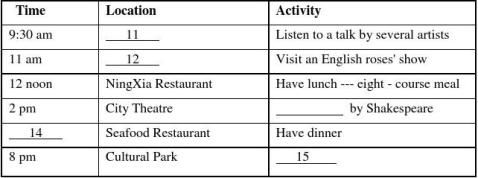
2
II语言知识及应用(共两节,满分45分)
第一节完形填空(共15小题,每小题2分,满分30分)
阅读下面短文,掌握其大意,然后从16-30各题所给的A. B,C和D项中,选出最佳选项,并在答题卡上将该项涂黑。
To my family and friends,
As some of you know, I have just started my tour in the remote mountain area. Everything is going really well, so no it has a lot of too. I have received several emails asking what I need while I'm here so I decided to write you all and let you know that I don’t need anything. At least not for me. I’m asking all of you to send me a few to help the local children. Let me explain.
On 12 May 2009, in a small village here, 120 school age girls were by a gas leak. Most have but 6 are still in hospital. Even though the local
government speaks about the of education for both boys and girls but most of these kids only attend school for four hours a day if they are even allowed to go. They are so excited and to learn, but then have to things like being sprayed with acid or poisoned. Most of these kids are poor and can’t a pencil, pen or even paper to write on. So my co-workers and I are planning a trip to several schools to promote and to give these kids some of the they need. That is where all of you come in. If you can, please whatever school supplies you currently have .
That would be a huge help.
I know how busy you are so thank you for taking the to do this and I will post pictures of this after we go.
Thank you again.
Todd Tucker
16. A. wonder B. worries C. problem D. way
17. A. surprises B. attractions C. problems D. mysteries
18. A. emails B. books C. items D. dollars
19. A. surprised B. confused C. discouraged D. poisoned
20. A. recovered B. died C. gone D. returned
21. A. fairness B. importance C. possibility D. absence
22. A. afraid B. unwilling C. able D. eager
23. A. receive B. challenge C. suffer D. return
24. A. find B. afford C. prepare D. expect
25. A. information B. education C. communication D. medication
26. A. supplies B. clothes C. knowledge D. awareness
27. A. send over B. send up C. send away D. send for
28. A. lost B. found C. used D. available
29. A. time B. chance C. responsibility D. lead
30. A. advertisement B. email C. donation D. event 3
第二节 语法填空(共10小题,每小题1.5分,满分15分)
阅读下面短文,按照句子结构的语法性和上下文连贯的要求,在空格处填入一个适当的词或使用括号中词语的正确形式填空,并将答案填写在答题卡标号为31-40的相应位置上。
If you put a buzzard (兀鹰) in a large cage that is entirely open at the top, the bird, in spite of his (able) to fly, will be an absolute prisoner. The reason is a buzzard always begins a flight from the ground with a run of ten or twelve feet. space to run, as is his habit, he will not even attempt to fly, but will remain a prisoner for life in a small jail with no top.
A bee, if (drop) into an open drinking glass, will be there it dies, unless it is taken out. It never sees the means of escape at the top, persists in trying to find some way through the sides near the bottom. It (seek) a way where none exists, until it completely destroys .
In many ways, there are lots of people like the buzzard and the bee. They are struggling about with all their problems and frustrations, not (realize) that the answer is right there above them.
III 阅读理解(共一节,20小题,每小题2分,满分40分)
阅读下列短文,从每题所给的A. B.C和D项中,选出最佳选项,并在答题卡上将该项涂黑。
A
For hundreds of years, Japan has been hit, from time to time, by enormous tsunamis. These awful sudden risings of the sea are caused by earthquakes or
underwater volcanic action. The story of the boy Yuuki is the story of such a disaster. Yuuki lived with his family in a sea-side village, below a small mountain. One day, as he played on top of the mountain, he felt an earthquake beneath his feet. It was not strong enough to frighten anybody and passed quickly. Soon after, however, Yuuki noticed the sea darken and begin running away from the shore very fast, leaving behind wide stretches of beach that had never been exposed before.
With a gasp, Yuuki remembered reading that just before a terrible tsunami, the sea suddenly and quickly rolls backward. He ran to the beach, warning the villagers who had gather to admire the huge new stretch of beach.
“Get back!” shouted the boy. “There is terrible danger!”
But no one listened. They laughed at him and continued playing in the new sand and watching the sea roll backward even more.
Desperate, Yuuki could think of only one thing to do. He lit a tree branch, raced to the rice fields and began burning the stacks of harvested rice. Then he called out, “Fire! Fire! Everyone run to the mountain! Now!”
When everyone reached the mountain-top, a villager cried out, “Yuuki is mad! I saw him set the fire.” Yuuki hung his head in shame, but said nothing as the villagers cursed him.
Just then, someone cried, “Look!”
4
In the distance what seemed to be a huge dark line was speeding towards the shore. As it got nearer the people realized the long thin line of darkness was the returning sea, towering like a mountain.
The villagers watched in terror as the water struck the shore, smashing over their homes then tearing out the land as it receded.
On the mountain everyone stared speechlessly at the destruction below. “I’m sorry I burned the fields,” said Yuuki, his voice trembling.
“Yuuki,” village-chief answered. “You saved us all.”
The villagers cheered and raised Yuuki into the air. “We were going to celebrate our rice harvest tonight,” said one, “but now we'll celebrate that we're all still alive!”
41. Where was Yuuki when the earthquake struck?
A. On the beach B. On the mountain.
C. In the rice fields. D. At his family home.
42. In what order do the following events take place?
a. Yuuki set fire to the rice fields.
b. The villagers laughed and played on the beach.
c. The land was torn away by the water.
d. Yuuki ran to warn the villagers.
e. The villagers stared at the destruction.
f. The people were cursing Yuuki.
A. d, b, e, a, c, f B. b, a, d, e, c, f C. d, b, a, f, c, e D. a, d, b, e, f, c
43. How did Yuuki save the villagers from the disaster?
A. He told them about the earthquake.
B. He explained why the sea was flowing out.
C. He told the village chief to warn the people.
D. He set fire to the rice fields.
44. What were the people planning to do before the tsunami struck their village?
A. Harvest the rice crop. B. Play on the beach.
C. Climb the mountain. D. Celebrate the rice harvest.
B
Fishing is a popular activity and every fisherman knows the rule: Keep the big ones, throw the smaller ones back. The idea behind Lt is simple - the larger fish are probably older. If you keep the smaller ones, they won’t be able to reproduce, and the fish population is in danger.
But fishing out the largest fish from a population has an unwanted effect: Over time, fewer adult fish get really big. If only the smaller fish reproduce, then future generations become smaller. This is an example of evolution in action.
One scientist, Dr David Conover has spent the last decade studying the effects of the “keep the big ones” rule and if they can be reversed.
5
To set up his experiment, Conover and his team caught hundreds of silverside fish and divided them into six groups. For two groups, Conover followed the “keep the large ones” rule and took out the biggest fish. For two other groups, he removed only the small fish.
For the last two groups, he removed fish at random (随意的).
After five years, he measured the fish in each group. In the two groups where the largest fish were regularly removed, the average fish size was smaller than the average size in the other groups. Here was evolution in action: If only small fish survive to reproduce, then future generations of fish will also tend to be small.
For the second five years of his experiment, Conover changed the rules and took fish randomly from each group. At the end of the experiment, he found that the fish that were in the “keep the large ones” group for the first five years had started to get larger again, although he calculated it would take at least 12 years for the fish in that group to return to their original size.
In other words, it takes less time to shrink than it does to recover.
45. The underlined word “it” (Line 2) refers to “
A. the activity B. the fish C. the rule D. the fisherman
46. Why do many people follow the “keep the big ones, throw the small ones back” rule?
A. It helps to protect fish numbers.
B. It helps to protect fish size.
C. It is the custom in most countries.
D. They will be punished if they don’t.
47. What did Conover find after the first five years of his experiment?
A. The “keep the big ones” rule made no difference to fish size.
B. The “keep the big ones” rule made fish smaller on average.
C. The “keep the big ones” rule made the fish bigger on average.
D. The “keep the big ones” rule affected all fish populations in the same way.
48. What is the author’s intention in writing this article?
A. To encourage people to fish more carefully.
B. To urge governments to change the rules of fishing.
C. To describe the results of a scientific experiment.
D. To introduce the rules of fishing to readers.
C
With only fish and birds for company, Eric Erden has been rowing across the Pacific Ocean to Australia in his 23-foot-long boat since he left California on July 10, 2009.
But crossing the Pacific is only part of his incredible journey. Eric has decided to go all the way around the world using only his own energy. He will row, bike, and 6
walk without help from any motors at all. Oh, and his plan includes climbing the tallest peak on six of the continents along the way, to honour the memory of a fellow climber.
He says he is doing this to show kids that they can achieve any goal, but he hopes to have some great adventures along the way.
As a solo traveller, Eric has already faced disappointments and challenges.
Because he has to row about ten hours a day, he brought along an MP3 player to listen to music and pass the time. Unfortunately, the nearly daily tropical rain for several months has forced him to keep his player packed away where it's safe and dry.
Storms and huge wave wind regularly force him in the wrong direction and even threaten to overturn his boat. “Sometimes I really feel scared,” says a somewhat embarrassed Eric. “But that’s all part of the journey. I knew this wouldn’t be easy when I started. That's why I gave myself two years to finish.”
Protein bars give him energy, and he boils water to heat freeze-dried meals on a one-burner stove. A solar-powered machine removes salt from ocean water so he can drink it, but only when the sun shines. When that fails he sometimes tries to collect rainwater in buckets.
He’s not bothered by any of the hardships. Eric sees the world as a laboratory where there is much to learn. And when his trip around the world takes him across land, he enjoys meeting people - especially children. He has already visited several schools and shared his story.
49. Why is Eric making this trip?
A. To encourage children to reach for their goal.
B. To learn more about the world around us.
C. To have many great adventures in strange lands.
D. To honour the memory of a fellow climber.
50. What does Eric plan to do on each of the six continents he will visit?
A. Visit schools to share his story.
B. Study the culture of the local people.
C. Climb the tallest mountain.
D. Cycle from one end to the other.
51. When does Eric expect to finish his journey?
A. July 2009. B. June 2010. C. January 2011. D. July 2011.
52. Which of the following words best describes Eric’s character?
A. Determined. B. Intelligent. C. Fearless. D. Lonely.
7
D
“I had a Welsh speaking test. I'd had to memorise a paragraph in front of the whole class. I just couldn’t do it,” says 13-year-old Mary. “I pretended to be ill.” But Mary did not enjoy her day off. “I watched TV all day — it was boring. I wished I had gone to school.”
Mary’s story is not unusual in Britain. According to the latest government figures, pupil absences are rising, despite schools taking a hard line on truancy (逃学).
Philippa James, a PhD researcher at Cardiff University’s school of social
sciences, thinks she knows why: “The more schools improve methods of detection, the more children work out better methods of deception.” Teenagers told her it was now harder to skip a single lesson, so they’d miss whole days to avoid being caught.
For several years, James has researched student truancy of 60 teenagers, aged 13 and 14, including Mary, to see how the teenagers truant, for how long, and why.
Through online conversations and face-to-face interviews, she discovered that most truancy was “a response to factors within the school”. Truants are not
necessarily less advanced or less intelligent. They complained of teachers who failed to engage them, and of “boring” lessons. “Many truants really enjoy school and believe in education, but drop out when aspects of it were ineffective.” James says.
The views of students like Adam, who believes that skipping lessons has little impact on his schooling, were common. “I only take-off for a lesson, or a couple of days. It doesn’t affect my education,” he told James.
James’ study concludes that schools need to address the question of why pupils want to leave in the first place. “Pupils need help from the start.” she says. “It’s a two-way process – schools must be responsive. We need to look at the reasons for truancy rather than the number, so that instead of walking away from school, students have the skills and chances to talk through problems and make a change.”
53. What is one of the reasons for school truancy according to James’ study?
A. Truants are fallen behind in their studies.
B. Truants have no interest in school subjects.
C. Truants have more interesting things to do.
D. Truants are not satisfied with the teachers.
54. The underlined phrase “taking a hard line” (paragraph 2) is closest in meaning to “ .
A. experiencing a problem with B. having a strict attitude towards
C. finding it difficult to solve D. having little success with
55. By citing Adam's remark, James wants to show that A. school education is not efficient and needs improvement
B. it’s a popular belief that occasional truancy won't cause much harm
C. school truancy is becoming more serious and needs more concern
D. even good students may sometimes need a break from school
8
56. What is Philippa James’ suggestion to schools?
A. Schools should solve the problem of teachers.
B. Schools should be more active in helping beginner truants.
C. Schools should have a better control of hidden truants.
D. Schools should find out who truant and how they it.
E
For travellers with a sense of adventure and who so want to experience some of the history and mystery of the ancient world, here is a list of cool destinations that you may want to consider for your next holiday.
Angkor Wat, Cambodia
Built in the 12th century, Angkor Wat (meaning “capital monastery”) was a temple in the ancient Khmer capital city of Angkor. It is Cambodia’s best-known tourist attraction and appears on the country’s flag. The temple is known for its beautiful architecture and reliefs. You'll need at least three days to fully discover the delights of the magnificent site.
Machu Picchu, Peru
Machu Picchu was built high in the Andes Mountains of South America by the Inca in the 15th century. Although well preserved its exact purpose is unknown. It is famous throughout the world not only for its incredible design but also for the natural beauty that surrounds it. Give yourself a week to explore this magnificent site and make you’re fit as there will be a lot of climbing.
Stonehenge, England
The entire Stonehenge site was constructed over thousands of years. But why and how it was built remains a mystery. As the weather can be pretty bleak in winter and the crowds huge in summer, we suggest autumn is the best time to visit these monster rocks.
Pompeii, Italy
When Mount Vesuvius erupted in 79 A.D., Pompeii was buried under many layers of ash, preserving the city exactly as it was when the volcano erupted. Because so many objects were preserved, archaeologists and visitors are able to better understand daily life in the ancient Roman Empire.
57. Which location offers the most direct view into daily life in the ancient world?
A. Pompeii. B. Stonehenge. C. Ankor Wat. D. Machu Piccu.
58. Why may people want to visit Machu Piccu?
A. To climb the Andes Mountains. B. To discover how it was built.
C. To explore both history and nature. D. To learn to speak Spanish.
9
59. When is the best time to visit Stonehenge?
A. Summer. B. Spring. C. Winter. D. Autumn.
60. Where would you probably read such an article?
A. In a history textbook. B. In an archeology journal.
C. In a travel magazine. D. In an adventure novel. 10
Ⅳ写作(共三节,满分45分)
第一节 完成句子 请根据句子的意思和汉语提示完成下列句子,每空只填一个
单词。(共10小题,每小题1分,满分10分)
(毕业) from Stanford with a degree in Law last summer.
(交通) of the city.
63. It’s everybody’ (保护) the wildlife.
64. It’ (解决) all problems.
(有害的) for the eyes.
(传统).
(对……满意) with the boy’s answer.
68. Without her family’ (支持) ,she couldn’t achieved her goal.
(污染).
(安排) for a taxi to meet Smith at the airport.
第二节 句子翻译 请根据中文及括号内的提示译下列句子。(共5小题,每小
题3分,满分15分)
71.三个男孩花了整整一周游遍了伦敦。(take)
72.一般而言,你在学习一门新的语言的时候总避免不了要犯错误。
(in general, avoid)
73.她给我们食物和衣服,没有要求任何回报,这一切让我们很感激。
(in return, be grateful, 定语从句)
74.父母去世后,他由他的姐姐抚养长大(被动语态,bring up)
75.位于美洲大陆的北部,加拿大是世界上第二大的国家。(Located in...,X is…)
第三节 写作(共1小题,满分20分)
【写作情景】
假设你是某国际学校广播站成员,请根据以下要点用英文拟写一份关于预防H1N1流感的通知。
1.勤洗手;
2.一旦感冒,马上就医;
3.病得较重的同学,建议在家休息直到医生说可以回校;
4.你的一、两个建议。
11
【写作要求】
1. 文章的开头与结尾已给出不计入词数;
2. 文章需包含要点的所有内容,字数100词左右。
【评分标准】
句子结构准确,信息内容完整,篇章结构连贯。
Announcement
Hello everyone. Here are some recommendations for keeping yourself healthy during H1N1 outbreak. …
May everybody be healthy and enjoy your study. That’s all. Thank you. 12
2009学年上学期广州市高中二年级学生学业水平测试
英语答卷
I 听力
第二节 听取信息(共5小题,每小题1分,满分5分)
11.
13. 12. 14. 15.
II 语言知识与应用
第二节 语法填空(共10小题,每小题1.5分,满分15分)
31.
34.
37.
40.
IV 写作
第一节 完成句子(共10小题,每小题1分,满分10分)
61.
64.
67.
70.
第二节 句子翻译(共5小题,每小题3分,满分15分)
71. 72. 73. 74. 75.
13 32. 35. 38. 33. 36. 39. 62. 65. 68. 63. 66. 69.
第三节 写作(共1小题,满分20分)
Announcement
Hello everyone. Here is some advice on how to keep yourself healthy and avoid the H1N1 flu May everybody be healthy and enjoy your study. That’s all. Thank you. 14
2009学年上学期广州市高中二年级学生学业水平测试
英语参考答案
I听力(共两节,满分20分)
第一节 听力理解(4段共10小题,每小题1.5分,满分15分)
1–5 CBABC 6–10 BAACB
第二节 听取信息(共5小题;每小题1分,满分5分)
11. City Museum 12. Flower Garden 13. Watch a play
14. 6:30 pm 15. Have a party
II语言知识及应用(共两节,满分45分)
第一节 完形填空(共15小题,每小题2分,满分30分)
16–20 BCCDA 21-25 BDCCB 26–30 AADAD
第二节语法填空(共10小题,每小题1.5分,满分15分)
31. laughing 32. who 33. other 34. swept 35. but
36. which 37. the 38. finally 39.with 40. best
III阅读理解(共一节,20小题,每小题2分,满分40分)
41-45 BCDDC 46-50 ABCAC 51–55 DADBD 56-60 BCDAA
Ⅳ写作(共三节,满分45分)
第一节 完成句子 请根据句子的意思和汉语提示完成下列句子,每空只填一个单词。(共10小题,每小题1分,满分10分)
61. graduated 62. transport / transportation 63. protect 64. solve
65. harmful 66. tradition 67. satisfied 68. support 69.pollution
70. arrange
第二节 句子翻译 请根据中文及括号内的提示翻译下列句子。(共5小题,每小题3分,满分15分)
71. It took the three boys a whole week to tour around London.
72. In general, you cannot avoid making mistakes when you learn a new
language.
73. She gave us food and clothes and asked for nothing in return, which made us
very grateful.
74. After his parents died, he was brought up by his elder sister.
75. Located in the North America continent, Canada is the second largest country in the world.
15
第三节 写作(共1小题,满分20分)
参考范文:
Announcement
Hello everyone. Here is some advice on how to keep yourself healthy and avoid the H1Nl flu. The most basic thing you should do is wash your hands frequently so as to reduce the chance to get infected. If any of you have caught a cold, you should go and see a doctor as soon as possible. For those with serious illness, we suggest you stay home and rest until the doctor tells you it’s safe to return to school. Then you’d better clean the surface of your desks and chairs at least daily. Do remember to open the doors and windows to let in enough fresh air even on cold winter days. Also, fruit and vegetables, as well as sports will surely do you good.
May everybody be healthy and enjoy your study. That’s all. Thank you.
2009学年上学期广州市高中二年级学生学业水平测试
英语评分标准
I 听力
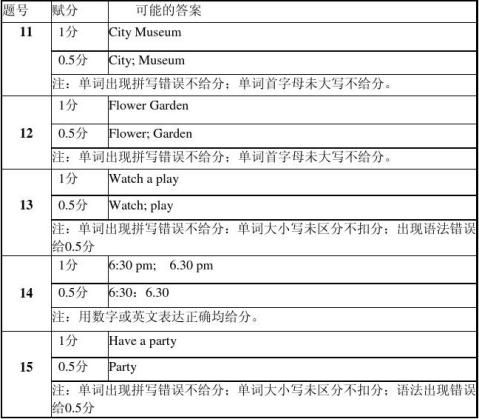
16
II 语言知识及应用
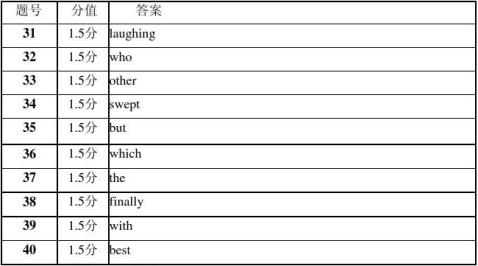
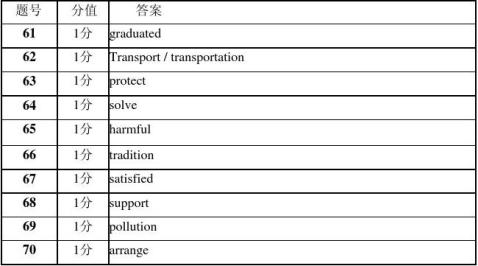
III写作
17
第二节句子翻译
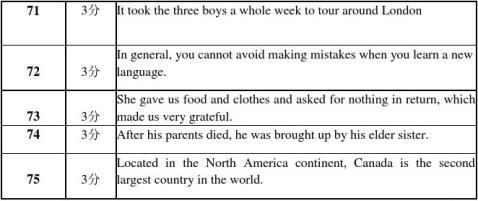
第三节 写作
【评分说明】写作的评分建议采用分析法,即,按照语言、内容和连贯三项指标
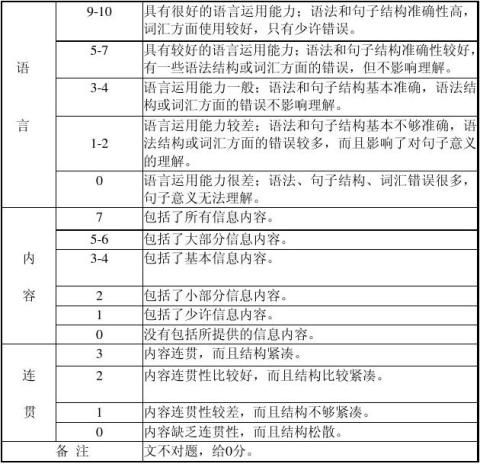
18
2009学年上学期广州市高中二年级学生学业水平测试
英语听力录音稿
I 听 力 (共两节,满分 20 分)
第一节 听力理解 (4 段共 10 小题,每小题1.5 分,满分 15 分) 每段播放两遍。各段后有几个小题,各段播放前每小题有 5 秒钟的阅题时间。请根据各 段播放内容及其相关小题,在 5 秒钟内从题中所给的 A、B、C 项中,选出最佳选项,并在 答题卡上将该项涂黑。
听下面一段对话,回答第 1-2 题。
(ring, ring)
M: Hello. Ronson’s Repair Shop. How can I help you?
W: Hi. There’s a problem with my television. I was watching a movie when suddenly everything went silent.
M: It doesn’t sound serious. I’m sure we can fix it. W: Great. How can I get it to you?
M: You can bring the TV to our shop or we can come to your home to pick it up. But there is a 20-dollar charge if we pick it up.
W: Can you pick it up this afternoon? My address is 127 Jones Street. M: No problem. Today is Tuesday. If everything goes smoothly I should be able to return the TV to you tomorrow.
W: Perfect. And how much will it cost?
M: We charge 50 dollars for all repairs.
W: Very reasonable. I’ll see you this afternoon. Bye.
M: Bye.
听下面一段对话,回答第 3-5 题。
W: Hi Rob. What are you listening to?
M: It’s a folk song by a new English band.
W: Folk music? Really? I thought you liked rock music.
M: I do. Rock music is my favourite. But I like jazz and rap too. Actually I like any kind of music, as long as it’s good.
W: Where did you get the song? At the music shop?
M: No. I downloaded it from the Internet. It was free from the band’s website.
W: Their website? That’s great.
M: Yes. You can download all their music there. They want you to do it. It’s like advertising. You should listen to it too. I’m sure you’ll like it.
W: I’d love to. What is the website?
M: I’ll email you the address tonight. W: Great. Thanks so much。
19
听下面一段独白,回答第 6-8 题。
It was our first phone-call of the morning. A young boy had knocked over a kettle of boiling water and badly burnt his arm. He needed to get to the hospital fast. The nurse and I hurried to the ambulance and set off at once. Traffic wasn’t heavy and I was able to drive us to the boy’s home in just a few minutes. When we arrived the boy was in the kitchen crying in pain. The nurse put his arm into some cool water then began to bandage the wound. Each time she moved the boy’s arm he cried out, so I talked to him to take his mind off the pain. He told me his name was Ben and was five years old. He had been trying to make a cup of tea for his mother but when he picked up the kettle of water it was too heavy and he dropped it on to his arm. When the nurse finished I gently put Ben into the back of the ambulance and started for the hospital. Ben was much calmer now and laughed as the nurse and his mother told him funny stories. We finally reached the hospital and I took Ben inside to the doctor. Then I returned to my ambulance to wait for the next call.
听第四段对话,回答第 9-10 题。
M: Hi Tracy. You look worried. What’s wrong?
W: Hi Bob. Nothing serious. It’s just the assignment for Mrs Jones’ class.
M: You mean the one about students’ after-school activities? What’s the problem? We just have to watch that TV program on Channel 9 this Sunday morning then do the survey. The survey should be easy if you’ve watched the program.
W: That’s just it. I can’t watch the program on Sunday. My cousin is getting married this Sunday morning and I have to go to the ceremony. M: Mm, that’s a problem. Why don’t you check the TV guide and see when the program will be shown again?
W: I’ve done that. It’s replayed on Monday evening. But that’s too late. We have to hand in the survey on Monday morning.
M: Yeah and Mrs Jones is never happy when assignments are late. I know that from experience. Hey I have an idea. I’m going to watch the program on Sunday, so why don’t I record it for you? You can come over to my place after the wedding and pick it up.
W: Oh Bob. That would be so fantastic. Then I can watch the show and do the survey on Sunday night. Can I come and get it at around 5 o’clock? M: No problem Tracy. I’ll see you then.
20
第二节 听取信息 (共 5 小题;每小题 1 分,满分 5 分)
听下面一段独白,请根据题目要求,从所听到的内容中获取必要的信息,填入答题卡标 号为 11-15 的空格中。听录音前,你将有 10 秒钟的阅题时间。录音读两遍,你将有 60 秒 钟的作答时间。
OK everyone. Take a copy of the schedule as you get on the bus. While we wait for the driver let’s go through what we’re doing today. It’s a very full programme so everyone please pay attention. We will be arriving at the City Museum at 9.30 am. That’s half an hour from now. There we will listen to a talk by several Chinese modern artists. At 10.45 we will board the bus and drive to the Flower Garden. We should arrive at 11 am and will be visiting an English roses’ show. According to the information I have there will be 150 different kinds of roses on display. At noon we will go to the NingXia Restaurant for lunch. A special eight-course meal has been prepared for us so don’t eat too many snacks in the morning. At two pm we will be going to the City Theatre to watch a play by William Shakespeare. At five pm you will have free time. You may want to take the opportunity to go shopping or do a little sightseeing on your own. We will meet at half past six at our hotel’s Seafood Restaurant for dinner. Then at eight pm we shall go to the Cultural Park to have a party.
21
